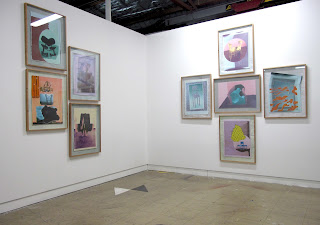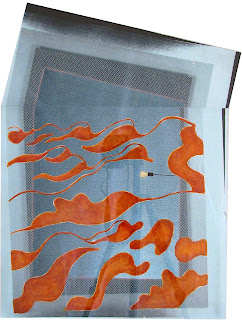Tuesday, April 30, 2013
Monday, April 1, 2013
APRIL EXHIBITIONS
Rebeccah Power : Rebel, mother, lover.
Sat 13th April 12-6 pm
.
My aim is to test the boundaries of ‘works on
paper’ in an attempt to express the complexity and multilayered nature of my
subject. This has resulted in an approach, which sees me using works on paper
as a prop, which is photographed, projected on top of the original work then
photographed and presented as a final projection. The works on paper have now
departed from their original state and have become projected images. A
connection between the materials is maintained through the process. The paper
now exists as an image of itself reflecting the transient quality of the
original material in the impermanence of the projection.
In my current exhibition at WOP Space,
evocative ink and watercolour portraits form the basis for this process.
Resulting in images that merge and defy the viewer. The layering process
combined with the luminosity of the projected images in a darkened space
intensifies the works expression and illuminates the stains and bleeds of the
pigment. The subject
expands from an interest
in the representation of roles of women and in challenging restrictive gender norms by focusing on the story of
Jean Lee, the last woman to be hanged in Australia. Within the weighty subject matter lurks a kind of morbid beauty.
This creates a sense of intrigue that is designed to evoke a range of emotional
reactions, on the one hand connected with the unknown wonderful and sublime yet
on the other violence, brutality and murder.
Raphael Buttonshaw
Sat 27th April 12-6pmArtist Statement
Through exploring interior environments as a ‘staging ground’ this
work aims to address the growing tension between design within contemporary
society and what might constitute contemporary art. Drawing from this idea as a
point of departure, I aim to introduce a deliberate strangeness to the function
of utility-based design objects that twists and subverts our perceived
conventions of interior space. This intervention seeks to rewire the
behavioural cues embedded in utility-based design and unsettle its social and
psychological narratives. It is an attempt to radically denature the appearance
of the environments with which we feel most at home. That ultimately proposes
the way we reflect upon the experience of these environments is increasingly
connected to our changes to the world at large.
Subscribe to:
Posts (Atom)













